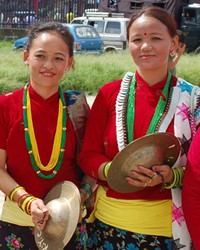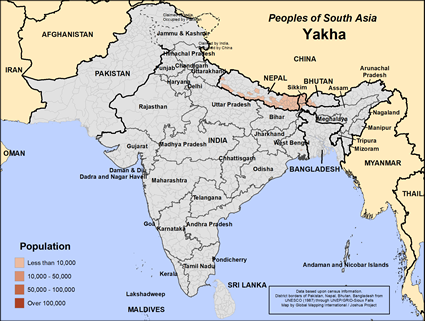Yakkha in India

Photo Source:
Copyrighted © 2026
International Mission Board-SBC All rights reserved. Used with permission |

Map Source:
People Group data: Omid. Map geography: UNESCO / GMI. Map Design: Joshua Project.
|
| People Name: | Yakkha |
| Country: | India |
| 10/40 Window: | Yes |
| Population: | 5,800 |
| World Population: | 30,800 |
| Primary Language: | Yakkha |
| Primary Religion: | Other / Small |
| Christian Adherents: | 6.80 % |
| Evangelicals: | 0.00 % |
| Scripture: | New Testament |
| Ministry Resources: | Yes |
| Jesus Film: | Yes |
| Audio Recordings: | Yes |
| People Cluster: | South Asia Tribal - other |
| Affinity Bloc: | South Asian Peoples |
| Progress Level: |
|
Introduction / History
According to one study, 'The Yakkha are a tribal group living in nearly 600 villages throughout the mountains of eastern Nepal. They are found throughout the Koshi Zone but are primarily just south of the city of Chainpur.' Yakha communities are spread across the Tehrathum, Sankuwasawa and Dhankuta districts within Koshi Zone. From one end of their territory in Nepal to the other is approximately 80 kilometres (49 mi.).
A migrant community of Yakkha has moved to north-east India. The majority of Yakha people in West Bengal believe in Hinduism, whereas almost all Yakkha in Sikkim are Buddhists. One source says, 'There are a few of them scattered in all the districts of Sikkim. Their natural environment is hilly terrain, moderately cold, humid, and without snowfall. '
The Yakha language is one that fascinates scholars. It appears to be related to Rai and Limbu, yet it has features that are distinctive from both. Yakkha is part of the Eastern Kiranti branch of the Tibeto-Burman family.
What Are Their Lives Like?
The Yakkha people live in isolated and mountainous parts of South Asia. They make their living through agriculture and livestock herding.
What Are Their Beliefs?
There are conflicting reports regarding the religious beliefs of the Yakkha. One source says, 'They are traditionally animists, but have adopted many of the Hindu customs and beliefs.' Another states, 'Most identify themselves as Buddhists. A few have embraced Hindu customs and beliefs because of their exposure to Nepalese and Indian culture.' Buddhist influence is strongest among the Yakha in the Sankhwasawa District, but it is more diluted the further south they are found.
Not only are the different accounts of the Yakha's religion confusing, but also a great variety of opinion exists on the status of Christianity among them. One source claims, 'Many Yakhas have heard the name of Jesus, and received Christian literature, but have not yet understood the message of the cross and Christianity. There are about 750 believers scattered throughout Yakha villages, which is about 3 per cent of the total Yakha population.'
A second report gives a less enthusiastic appraisal of the gospel among this group. 'Christianity is considered a low-caste or foreign religion. As a result, many Yakha are very anti-Christian and would excommunicate from their communities any who become Christian. This kind of threatened separation from the tribe is a formidable barrier to most in the Yakha culture. One key to reaching the Yakha with the gospel, however, may be their desire and deep respect for traits such as honesty and kindness. Believers who have opportunities to live Christ-filled lives before the Yakha may be able to gain their respect and point them to the Author of Life.' Among the Yakha in India, 'some have recently become Christianized. They are those who know the least about their language, culture and ethnic feelings. '
What Are Their Needs?
The Yakha people need the spiritual hunger it takes to overcome societal pressure to conform to the old ways. Jesus Christ is for everyone!
Prayer Points
Pray for the Holy Spirit to give the Yakha people teachable and understanding hearts. Pray that a strong movement of the Holy Spirit will bring entire Yakha families into a rich experience of God's blessing. Pray for Yakha families to be drawn by the Holy Spirit to seek forgiveness, and to understand the adequacy of Christ's work on the cross. Pray for teams of believers to do sustained, focused prayer for the Lord to open the hearts of Yakha family leaders to experience God's blessing through a movement of family-based discovery Bible studies.